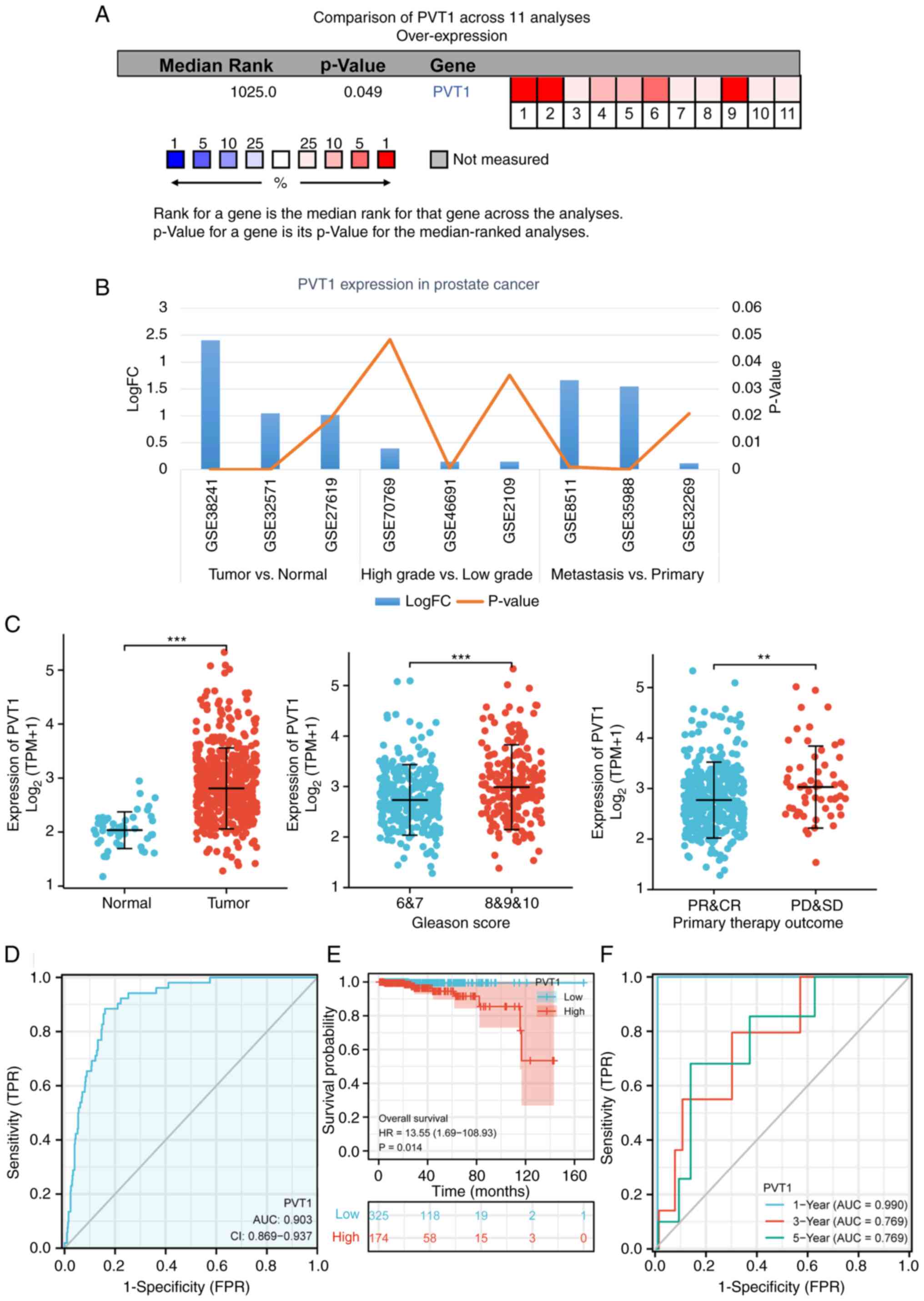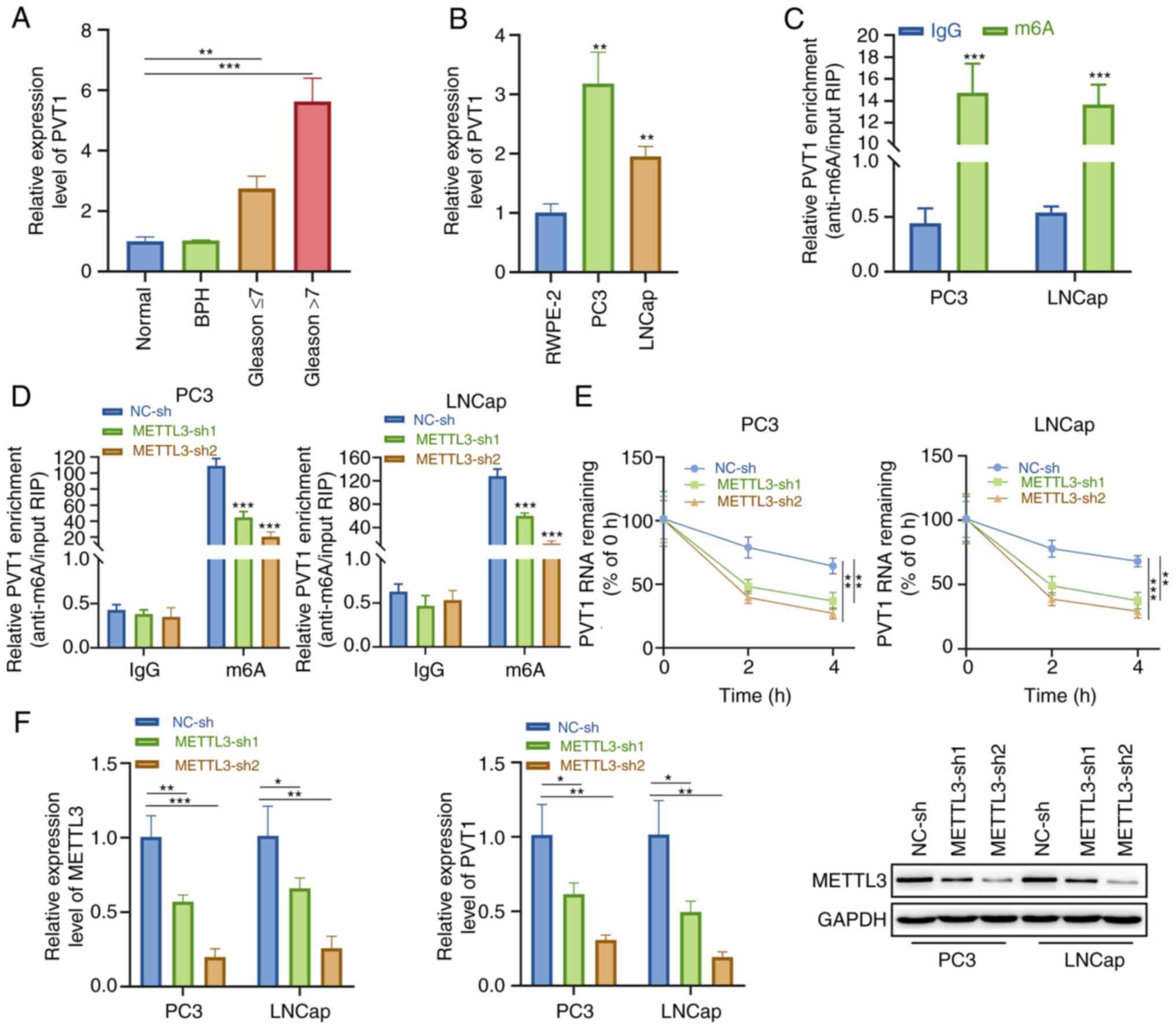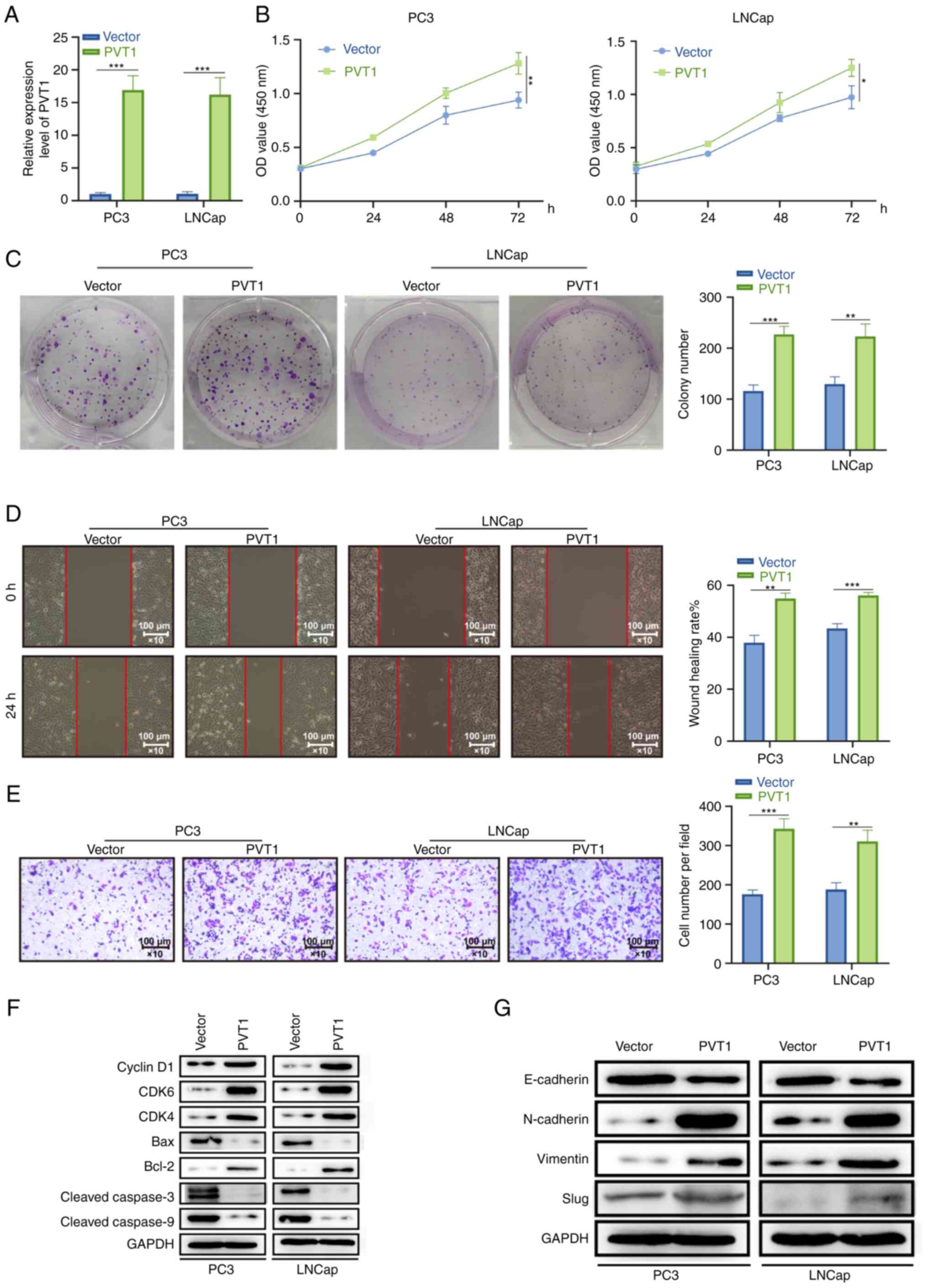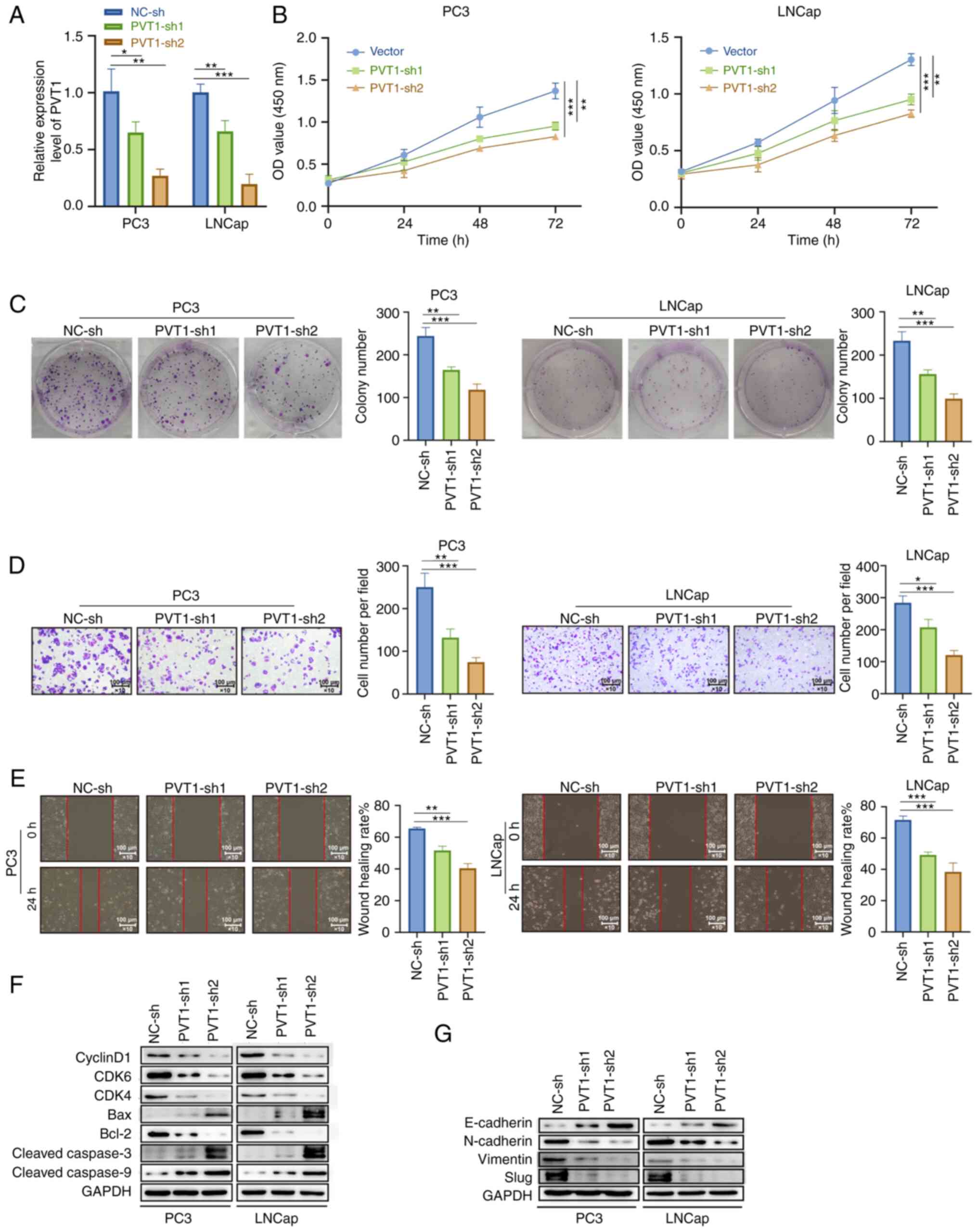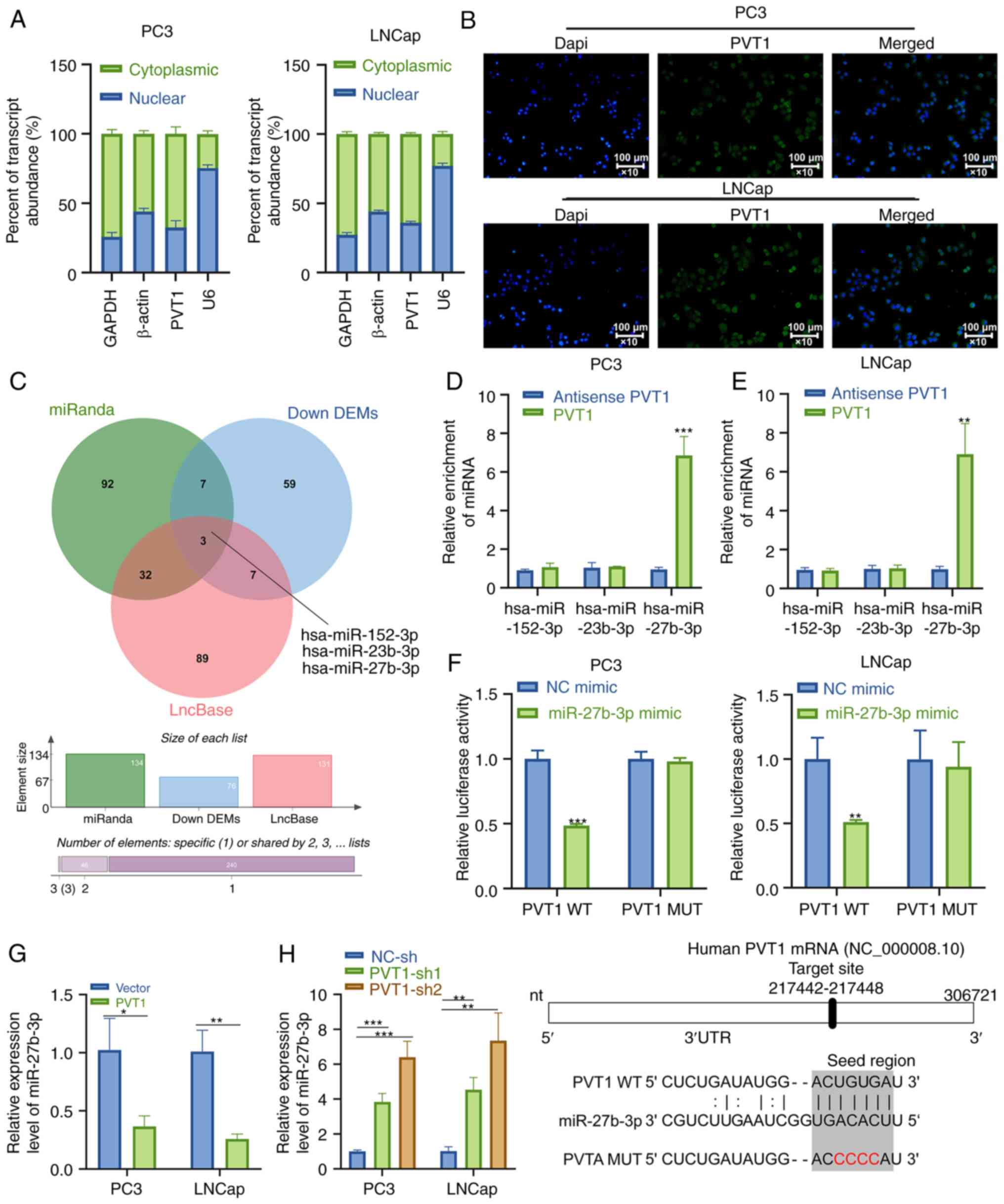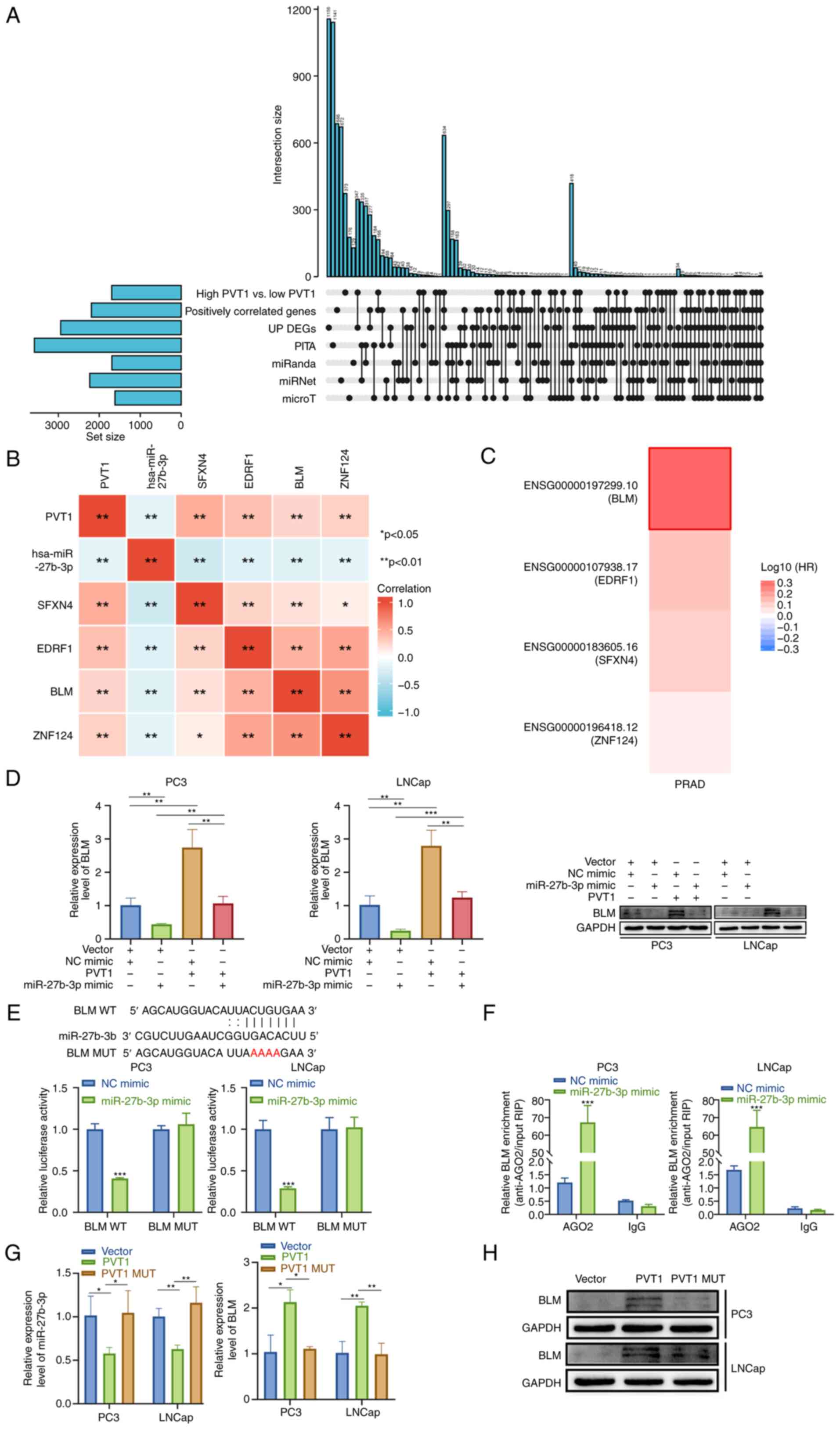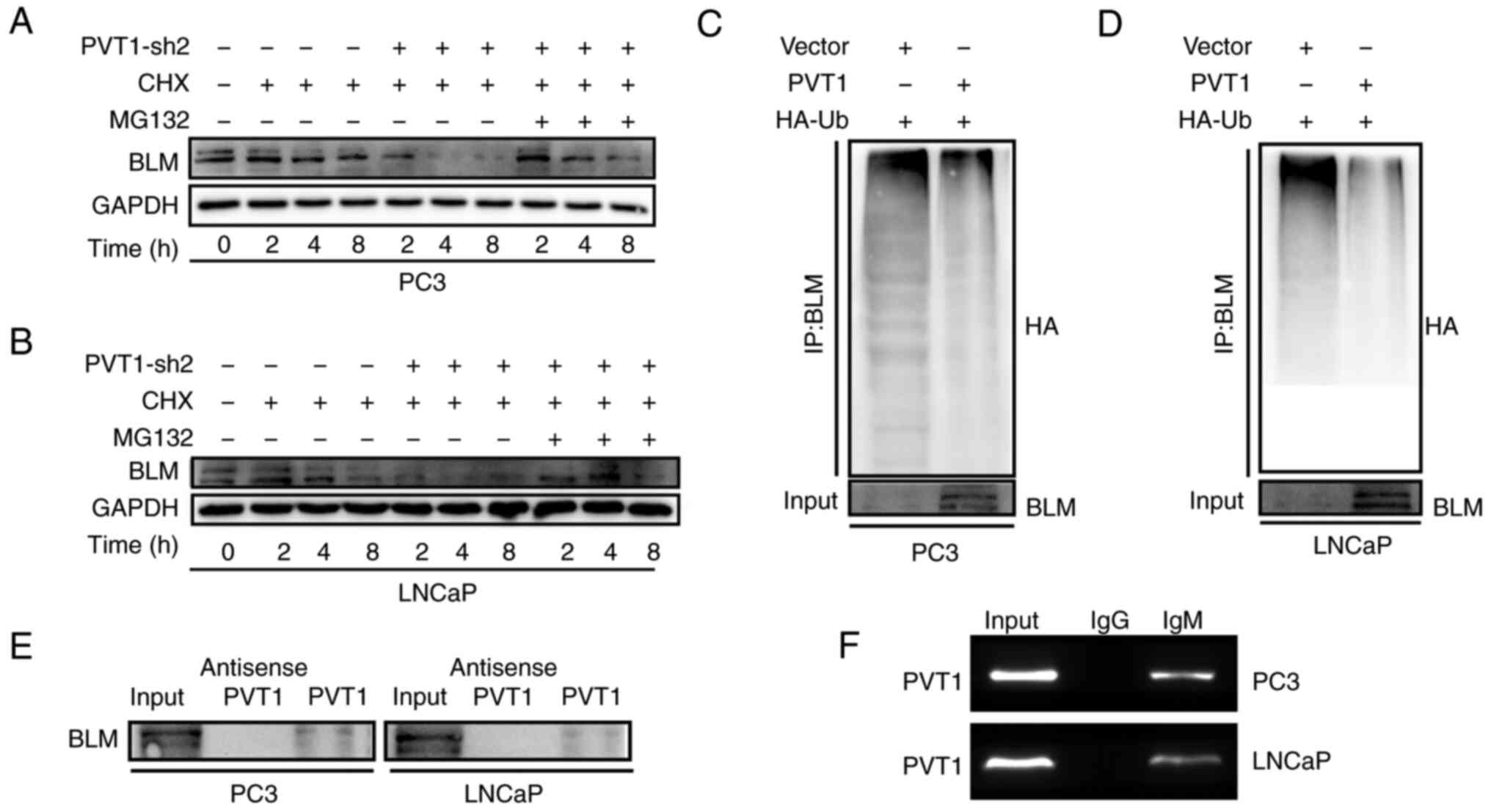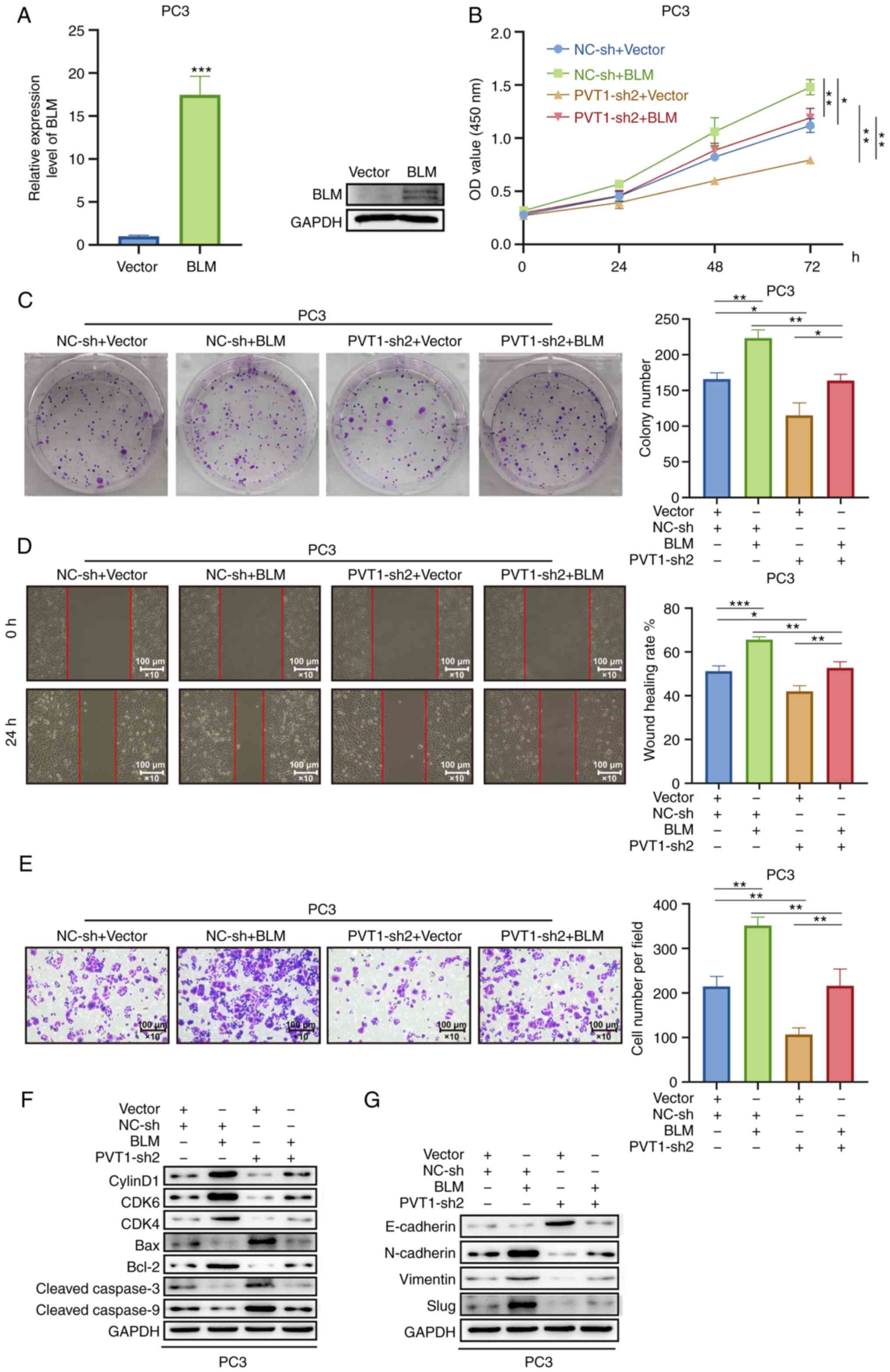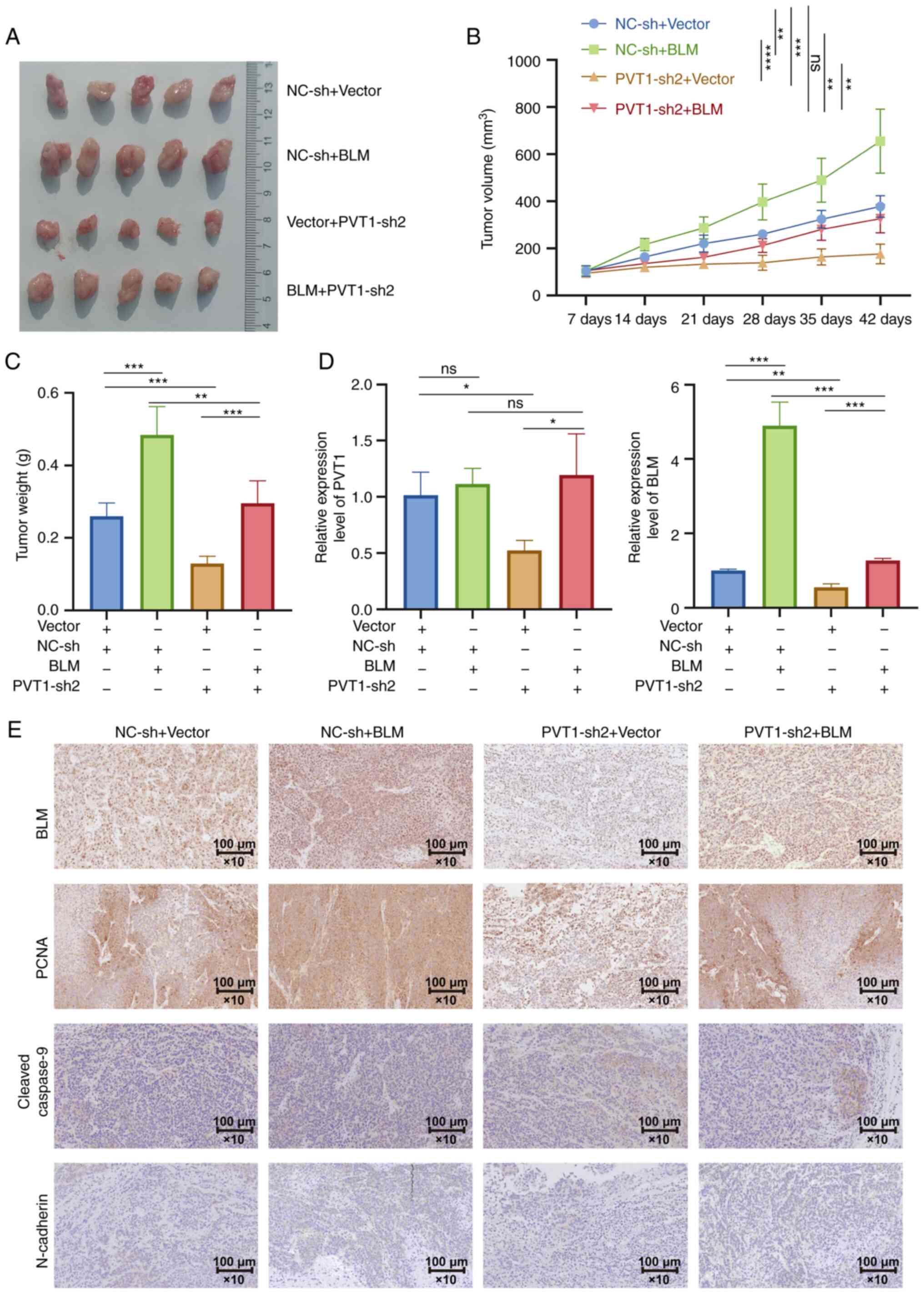|
1
|
Siegel RL, Miller KD and Jemal A: Cancer
statistics, 2020. CA Cancer J Clin. 70:7–30. 2020. View Article : Google Scholar : PubMed/NCBI
|
|
2
|
Kimura T and Egawa S: Epidemiology of
prostate cancer in Asian countries. Int J Urol. 25:524–531. 2018.
View Article : Google Scholar : PubMed/NCBI
|
|
3
|
Teo MY, Rathkopf DE and Kantoff P:
Treatment of advanced prostate cancer. Annu Rev Med. 70:479–499.
2019. View Article : Google Scholar : PubMed/NCBI
|
|
4
|
Rebbeck TR: Prostate cancer genetics:
Variation by race, ethnicity, and geography. Semin Radiat Oncol.
27:3–10. 2017. View Article : Google Scholar
|
|
5
|
Kaiser A, Haskins C, Siddiqui MM, Hussain
A and D'Adamo C: The evolving role of diet in prostate cancer risk
and progression. Curr Opin Oncol. 31:222–229. 2019. View Article : Google Scholar : PubMed/NCBI
|
|
6
|
Moammeri A, Abbaspour K, Zafarian A,
Jamshidifar E, Motasadizadeh H, Dabbagh Moghaddam F, Salehi Z,
Makvandi P and Dinarvand R: pH-Responsive, adorned nanoniosomes for
codelivery of cisplatin and epirubicin: Synergistic treatment of
breast cancer. ACS Appl Bio Mater. 5:675–690. 2022. View Article : Google Scholar : PubMed/NCBI
|
|
7
|
Ramezani Farani M, Azarian M, Heydari
Sheikh Hossein H, Abdolvahabi Z, Mohammadi Abgarmi Z, Moradi A,
Mousavi SM, Ashrafizadeh M, Makvandi P, Saeb MR and Rabiee N: Folic
acid-adorned curcumin-loaded iron oxide nanoparticles for cervical
cancer. ACS Appl Bio Mater. 5:1305–1318. 2022. View Article : Google Scholar : PubMed/NCBI
|
|
8
|
Sharifi E, Bigham A, Yousefiasl S, Trovato
M, Ghomi M, Esmaeili Y, Samadi P, Zarrabi A, Ashrafizadeh M,
Sharifi S, et al: Mesoporous bioactive glasses in cancer diagnosis
and therapy: Stimuli-responsive, toxicity, immunogenicity, and
clinical translation. Adv Sci (Weinh). 9:e21026782022. View Article : Google Scholar
|
|
9
|
Snow O, Lallous N, Singh K, Lack N, Rennie
P and Cherkasov A: Androgen receptor plasticity and its
implications for prostate cancer therapy. Cancer Treat Rev.
81:1018712019. View Article : Google Scholar : PubMed/NCBI
|
|
10
|
Yassin A, AlRumaihi K, Alzubaidi R,
Alkadhi S and Al Ansari A: Testosterone, testosterone therapy and
prostate cancer. Aging Male. 22:219–227. 2019. View Article : Google Scholar : PubMed/NCBI
|
|
11
|
Zhang H, Shi X, Huang T, Zhao X, Chen W,
Gu N and Zhang R: Dynamic landscape and evolution of m6A
methylation in human. Nucleic Acids Res. 48:6251–6264. 2020.
View Article : Google Scholar : PubMed/NCBI
|
|
12
|
Yang Y, Hsu PJ, Chen YS and Yang YG:
Dynamic transcriptomic m6A decoration: Writers, erasers,
readers and functions in RNA metabolism. Cell Res. 28:616–624.
2018. View Article : Google Scholar : PubMed/NCBI
|
|
13
|
Sun T, Wu R and Ming L: The role of m6A
RNA methylation in cancer. Biomed Pharmacother. 112:1086132019.
View Article : Google Scholar : PubMed/NCBI
|
|
14
|
Wang T, Kong S, Tao M and Ju S: The
potential role of RNA N6-methyladenosine in Cancer progression. Mol
Cancer. 19:882020. View Article : Google Scholar : PubMed/NCBI
|
|
15
|
Boon RA, Jae N, Holdt L and Dimmeler S:
Long Noncoding RNAs: From clinical genetics to therapeutic targets?
J Am Coll Cardiol. 67:1214–1226. 2016. View Article : Google Scholar : PubMed/NCBI
|
|
16
|
Jiang R, Tang J, Chen Y, Deng L, Ji J, Xie
Y, Wang K, Jia W, Chu WM and Sun B: The long noncoding RNA lnc-EGFR
stimulates T-regulatory cells differentiation thus promoting
hepatocellular carcinoma immune evasion. Nat Commun. 8:151292017.
View Article : Google Scholar : PubMed/NCBI
|
|
17
|
Li J, Tian H, Yang J and Gong Z: Long
Noncoding RNAs regulate cell growth, proliferation, and apoptosis.
DNA Cell Biol. 35:459–470. 2016. View Article : Google Scholar : PubMed/NCBI
|
|
18
|
Paraskevopoulou MD and Hatzigeorgiou AG:
Analyzing MiRNA-LncRNA interactions. Methods Mol Biol.
1402:271–286. 2016. View Article : Google Scholar : PubMed/NCBI
|
|
19
|
Ashrafizadeh M, Paskeh MDA, Mirzaei S,
Gholami MH, Zarrabi A, Hashemi F, Hushmandi K, Hashemi M, Nabavi N,
Crea F, et al: Targeting autophagy in prostate cancer: Preclinical
and clinical evidence for therapeutic response. J Exp Clin Cancer
Res. 41:1052022. View Article : Google Scholar : PubMed/NCBI
|
|
20
|
Ashrafizaveh S, Ashrafizadeh M, Zarrabi A,
Husmandi K, Zabolian A, Shahinozzaman M, Aref AR, Hamblin MR,
Nabavi N, Crea F, et al: Long non-coding RNAs in the doxorubicin
resistance of cancer cells. Cancer Lett. 508:104–114. 2021.
View Article : Google Scholar : PubMed/NCBI
|
|
21
|
Mirzaei S, Zarrabi A, Hashemi F, Zabolian
A, Saleki H, Ranjbar A, Seyed Saleh SH, Bagherian M, Sharifzadeh
SO, Hushmandi K, et al: Regulation of Nuclear Factor-KappaB (NF-κB)
signaling pathway by non-coding RNAs in cancer: Inhibiting or
promoting carcinogenesis? Cancer Lett. 509:63–80. 2021. View Article : Google Scholar : PubMed/NCBI
|
|
22
|
Zhang Y, Tan Y, Wang H, Xu M and Xu L:
Long Non-Coding RNA plasmacytoma variant translocation 1 (PVT1)
enhances proliferation, migration, and epithelial-mesenchymal
transition (EMT) of pituitary adenoma cells by activating
β-catenin, c-Myc, and cyclin D1 expression. Med Sci Monit.
25:7652–7659. 2019. View Article : Google Scholar : PubMed/NCBI
|
|
23
|
Wu H, Tian X and Zhu C: Knockdown of
lncRNA PVT1 inhibits prostate cancer progression in vitro and in
vivo by the suppression of KIF23 through stimulating miR-15a-5p.
Cancer Cell Int. 20:2832020. View Article : Google Scholar : PubMed/NCBI
|
|
24
|
Liu J, Li Y, Zhang Q, Lv C, Wang M, Jiao Y
and Wang C: PVT1 expression is a predictor for poor survival of
prostate cancer patients. Technol Cancer Res Treat.
20:15330338209716102021. View Article : Google Scholar : PubMed/NCBI
|
|
25
|
Zhao J, Du P, Cui P, Qin Y, Hu C, Wu J,
Zhou Z, Zhang W, Qin L and Huang G: LncRNA PVT1 promotes
angiogenesis via activating the STAT3/VEGFA axis in gastric cancer.
Oncogene. 37:4094–4109. 2018. View Article : Google Scholar : PubMed/NCBI
|
|
26
|
Chen S, Zhou L and Wang Y: ALKBH5-mediated
m6A demethylation of lncRNA PVT1 plays an oncogenic role
in osteosarcoma. Cancer Cell Int. 20:342020. View Article : Google Scholar
|
|
27
|
Qi X, Zhang DH, Wu N, Xiao JH, Wang X and
Ma W: ceRNA in cancer: Possible functions and clinical
implications. J Med Genet. 52:710–718. 2015. View Article : Google Scholar : PubMed/NCBI
|
|
28
|
Liu K and Xu Q: LncRNA PVT1 regulates
gallbladder cancer progression through miR-30d-5p. J Biol Regul
Homeost Agents. 34:875–883. 2020.PubMed/NCBI
|
|
29
|
Zhou C, Yi C, Yi Y, Qin W, Yan Y, Dong X,
Zhang X, Huang Y, Zhang R, Wei J, et al: LncRNA PVT1 promotes
gemcitabine resistance of pancreatic cancer via activating
Wnt/beta-catenin and autophagy pathway through modulating the
miR-619-5p/Pygo2 and miR-619-5p/ATG14 axes. Mol Cancer. 19:1182020.
View Article : Google Scholar
|
|
30
|
Schmittgen TD and Livak KJ: Analyzing
real-time PCR data by the comparative C(T) method. Nat Protoc.
3:1101–1108. 2008. View Article : Google Scholar : PubMed/NCBI
|
|
31
|
Song YX, Sun JX, Zhao JH, Yang YC, Shi JX,
Wu ZH, Chen XW, Gao P, Miao ZF and Wang ZN: Non-coding RNAs
participate in the regulatory network of CLDN4 via ceRNA mediated
miRNA evasion. Nat Commun. 8:2892017. View Article : Google Scholar : PubMed/NCBI
|
|
32
|
Hu Y, Rao SS, Wang ZX, Cao J, Tan YJ, Luo
J, Li HM, Zhang WS, Chen CY and Xie H: Exosomes from human
umbilical cord blood accelerate cutaneous wound healing through
miR-21-3p-mediated promotion of angiogenesis and fibroblast
function. Theranostics. 8:169–184. 2018. View Article : Google Scholar : PubMed/NCBI
|
|
33
|
Arredouani MS, Lu B, Bhasin M, Eljanne M,
Yue W, Mosquera JM, Bubley GJ, Li V, Rubin MA, Libermann TA and
Sanda MG: Identification of the transcription factor single-minded
homologue 2 as a potential biomarker and immunotherapy target in
prostate cancer. Clin Cancer Res. 15:5794–5802. 2009. View Article : Google Scholar : PubMed/NCBI
|
|
34
|
Lapointe J, Li C, Higgins JP, van de Rijn
M, Bair E, Montgomery K, Ferrari M, Egevad L, Rayford W, Bergerheim
U, et al: Gene expression profiling identifies clinically relevant
subtypes of prostate cancer. Proc Natl Acad Sci USA. 101:811–816.
2004. View Article : Google Scholar : PubMed/NCBI
|
|
35
|
LaTulippe E, Satagopan J, Smith A, Scher
H, Scardino P, Reuter V and Gerald WL: Comprehensive gene
expression analysis of prostate cancer reveals distinct
transcriptional programs associated with metastatic disease. Cancer
Res. 62:4499–4506. 2002.PubMed/NCBI
|
|
36
|
Luo JH, Yu YP, Cieply K, Lin F, Deflavia
P, Dhir R, Finkelstein S, Michalopoulos G and Becich M: Gene
expression analysis of prostate cancers. Mol Carcinog. 33:25–35.
2002. View Article : Google Scholar : PubMed/NCBI
|
|
37
|
Singh D, Febbo PG, Ross K, Jackson DG,
Manola J, Ladd C, Tamayo P, Renshaw AA, D'Amico AV, Richie JP, et
al: Gene expression correlates of clinical prostate cancer
behavior. Cancer Cell. 1:203–209. 2002. View Article : Google Scholar : PubMed/NCBI
|
|
38
|
Taylor BS, Schultz N, Hieronymus H,
Gopalan A, Xiao Y, Carver BS, Arora VK, Kaushik P, Cerami E, Reva
B, et al: Integrative genomic profiling of human prostate cancer.
Cancer Cell. 18:11–22. 2010. View Article : Google Scholar : PubMed/NCBI
|
|
39
|
Tomlins SA, Mehra R, Rhodes DR, Cao X,
Wang L, Dhanasekaran SM, Kalyana-Sundaram S, Wei JT, Rubin MA,
Pienta KJ, et al: Integrative molecular concept modeling of
prostate cancer progression. Nat Genet. 39:41–51. 2007. View Article : Google Scholar
|
|
40
|
Varambally S, Yu J, Laxman B, Rhodes DR,
Mehra R, Tomlins SA, Shah RB, Chandran U, Monzon FA, Becich MJ, et
al: Integrative genomic and proteomic analysis of prostate cancer
reveals signatures of metastatic progression. Cancer Cell.
8:393–406. 2005. View Article : Google Scholar : PubMed/NCBI
|
|
41
|
Welsh JB, Sapinoso LM, Su Al, Kern SG,
Wang-Rodriguez J, Moskaluk CA, Frierson HF Jr and Hampton GM:
Analysis of gene expression identifies candidate markers and
pharmacological targets in prostate cancer. Cancer Res.
61:5974–5978. 2001.PubMed/NCBI
|
|
42
|
Yu YP, Landsittel D, Jing L, Nelson J, Ren
B, Liu L, McDonald C, Thomas R, Dhir R, Finkelstein S, et al: Gene
expression alterations in prostate cancer predicting tumor
aggression and preceding development of malignancy. J Clin Oncol.
22:2790–2799. 2004. View Article : Google Scholar : PubMed/NCBI
|
|
43
|
Wang R and Liu X: Epigenetic regulation of
prostate cancer. Genes Dis. 7:606–613. 2019. View Article : Google Scholar
|
|
44
|
Li J, Xie H, Ying Y, Chen H, Yan H, He L,
Xu M, Xu X, Liang Z, Liu B, et al: YTHDF2 mediates the mRNA
degradation of the tumor suppressors to induce AKT phosphorylation
in N6-methyladenosine-dependent way in prostate cancer. Mol Cancer.
19:1522020. View Article : Google Scholar : PubMed/NCBI
|
|
45
|
Grasso CS, Wu YM, Robinson DR, Cao X,
Dhanasekaran SM, Khan AP, Quist MJ, Jing X, Lonigro RJ, Brenner JC,
et al: The mutational landscape of lethal castration-resistant
prostate cancer. Nature. 487:239–243. 2012. View Article : Google Scholar : PubMed/NCBI
|
|
46
|
Liu P, Ramachandran S, Ali Seyed M,
Scharer CD, Laycock N, Dalton WB, Williams H, Karanam S, Datta MW,
Jaye DL and Moreno CS: Sex-determining region Y box 4 is a
transforming oncogene in human prostate cancer cells. Cancer Res.
66:4011–4019. 2006. View Article : Google Scholar : PubMed/NCBI
|
|
47
|
Ding C, Yang Z, Lv Z, DU C, Xiao H, Peng
C, Cheng S, Xie H, Zhou L, Wu J and Zheng S: Long non-coding RNA
PVT1 is associated with tumor progression and predicts recurrence
in hepatocellular carcinoma patients. Oncol Lett. 9:955–963. 2015.
View Article : Google Scholar : PubMed/NCBI
|
|
48
|
Li KK, Lau KM and Ng HK: Signaling pathway
and molecular subgroups of medulloblastoma. Int J Clin Exp Pathol.
6:1211–1222. 2013.PubMed/NCBI
|
|
49
|
Lin HY, Callan CY, Fang Z, Tung HY and
Park JY: Interactions of PVT1 and CASC11 on prostate cancer risk in
african americans. Cancer Epidemiol Biomarkers Prev. 28:1067–1075.
2019. View Article : Google Scholar : PubMed/NCBI
|
|
50
|
Videira A, Beckedorff FC, daSilva LF and
Verjovski-Almeida S: PVT1 signals an androgen-dependent
transcriptional repression program in prostate cancer cells and a
set of the repressed genes predicts high-risk tumors. Cell Commun
Signal. 19:52021. View Article : Google Scholar : PubMed/NCBI
|
|
51
|
Yang J, Li C, Mudd A and Gu X: LncRNA PVT1
predicts prognosis and regulates tumor growth in prostate cancer.
Biosci Biotechnol Biochem. 81:2301–2306. 2017. View Article : Google Scholar : PubMed/NCBI
|
|
52
|
Yan YJ, Zhang L, Zhou JJ, Chen ZJ, Liao
YX, Zeng JM and Shen H: Comprehensive characterization of common
and cancer-specific differently expressed lncRNAs in urologic
cancers. Comput Math Methods Med. 2021:55152182021. View Article : Google Scholar : PubMed/NCBI
|
|
53
|
Lyko F and Brown R: DNA methyltransferase
inhibitors and the development of epigenetic cancer therapies. J
Natl Cancer Inst. 97:1498–1506. 2005. View Article : Google Scholar : PubMed/NCBI
|
|
54
|
Tuncel G and Kalkan R: Importance of m
N6-methyladenosine (m6A) RNA modification in
cancer. Med Oncol. 36:362019. View Article : Google Scholar
|
|
55
|
Sun HL, Zhu AC, Gao Y, Terajima H, Fei Q,
Liu S, Zhang L, Zhang Z, Harada BT, He YY, et al: Stabilization of
ERK-Phosphorylated METTL3 by USP5 Increases m6A
Methylation. Mol Cell. 80:633–647.e7. 2020. View Article : Google Scholar
|
|
56
|
Liu N, Parisien M, Dai Q, Zheng G, He C
and Pan T: Probing N6-methyladenosine RNA modification status at
single nucleotide resolution in mRNA and long noncoding RNA. RNA.
19:1848–1856. 2013. View Article : Google Scholar : PubMed/NCBI
|
|
57
|
Amort T, Rieder D, Wille A,
Khokhlova-Cubberley D, Riml C, Trixl L, Jia XY, Micura R and Lusser
A: Distinct 5-methylcytosine profiles in poly(A) RNA from mouse
embryonic stem cells and brain. Genome Biol. 18:12017. View Article : Google Scholar : PubMed/NCBI
|
|
58
|
Wang X, Lu Z, Gomez A, Hon GC, Yue Y, Han
D, Fu Y, Parisien M, Dai Q, Jia G, et al:
N6-methyladenosine-dependent regulation of messenger RNA stability.
Nature. 505:117–120. 2014. View Article : Google Scholar
|
|
59
|
Chan JJ and Tay Y: Noncoding RNA:RNA
regulatory networks in cancer. Int J Mol Sci. 19:13102018.
View Article : Google Scholar : PubMed/NCBI
|
|
60
|
Sun F, Wu K, Yao Z, Mu X, Zheng Z, Sun M,
Wang Y, Liu Z and Zhu Y: Long Noncoding RNA PVT1 promotes prostate
cancer metastasis by increasing NOP2 expression via targeting tumor
suppressor MicroRNAs. Onco Targets Ther. 13:6755–6765. 2020.
View Article : Google Scholar : PubMed/NCBI
|
|
61
|
Liu HT, Fang L, Cheng YX and Sun Q: LncRNA
PVT1 regulates prostate cancer cell growth by inducing the
methylation of miR-146a. Cancer Med. 5:3512–3519. 2016. View Article : Google Scholar : PubMed/NCBI
|
|
62
|
Chang Z, Cui J and Song Y: Long noncoding
RNA PVT1 promotes EMT via mediating microRNA-186 targeting of
Twist1 in prostate cancer. Gene. 654:36–42. 2018. View Article : Google Scholar : PubMed/NCBI
|
|
63
|
Lu J, Xu F and Lu H: LncRNA PVT1 regulates
ferroptosis through miR-214-mediated TFR1 and p53. Life Sci.
260:1183052020. View Article : Google Scholar : PubMed/NCBI
|
|
64
|
Chen J, Yu Y, Li H, Hu Q, Chen X, He Y,
Xue C, Ren F, Ren Z, Li J, et al: Long non-coding RNA PVT1 promotes
tumor progression by regulating the miR-143/HK2 axis in gallbladder
cancer. Mol Cancer. 18:332019. View Article : Google Scholar : PubMed/NCBI
|
|
65
|
Han M, Li N, Li F, Wang H and Ma L:
MiR-27b-3p exerts tumor suppressor effects in esophageal squamous
cell carcinoma by targeting Nrf2. Hum Cell. 33:641–651. 2020.
View Article : Google Scholar : PubMed/NCBI
|
|
66
|
Sun Y, Xu T, Cao YW and Ding XQ: Antitumor
effect of miR-27b-3p on lung cancer cells via targeting Fzd7. Eur
Rev Med Pharmacol Sci. 21:4113–4123. 2017.PubMed/NCBI
|
|
67
|
Li S, Zhao X, Cheng S, Li J, Bai X and
Meng X: Downregulating long non-coding RNA PVT1 expression
inhibited the viability, migration and phenotypic switch of
PDGF-BB-treated human aortic smooth muscle cells via targeting
miR-27b-3p. Hum Cell. 34:335–348. 2021. View Article : Google Scholar
|
|
68
|
Lu X, Yu Y, Yin F, Yang C, Li B, Lin J and
Yu H: Knockdown of PVT1 inhibits IL-1β-induced injury in
chondrocytes by regulating miR-27b-3p/TRAF3 axis. Int
Immunopharmacol. 79:1060522020. View Article : Google Scholar
|
|
69
|
Ledet EM, Antonarakis ES, Isaacs WB, Lotan
TL, Pritchard C and Sartor AO: Germline BLM mutations and
metastatic prostate cancer. Prostate. 80:235–237. 2020. View Article : Google Scholar :
|
|
70
|
Ruan Y, Xu H, Ji X and Zhao J: BLM
interaction with EZH2 regulates MDM2 expression and is a poor
prognostic biomarker for prostate cancer. Am J Cancer Res.
11:1347–1368. 2021.PubMed/NCBI
|
|
71
|
Deng L, Meng T, Chen L, Wei W and Wang P:
The role of ubiquitination in tumorigenesis and targeted drug
discovery. Signal Transduct Target Ther. 5:112020. View Article : Google Scholar : PubMed/NCBI
|
|
72
|
Chen Y, Zhao J, Duan Z, Gong T, Chen W,
Wang S and Xu H: miR27b3p and miR607 cooperatively regulate BLM
gene expression by directly targeting the 3′UTR in PC3 cells. Mol
Med Rep. 19:4819–4831. 2019.PubMed/NCBI
|















